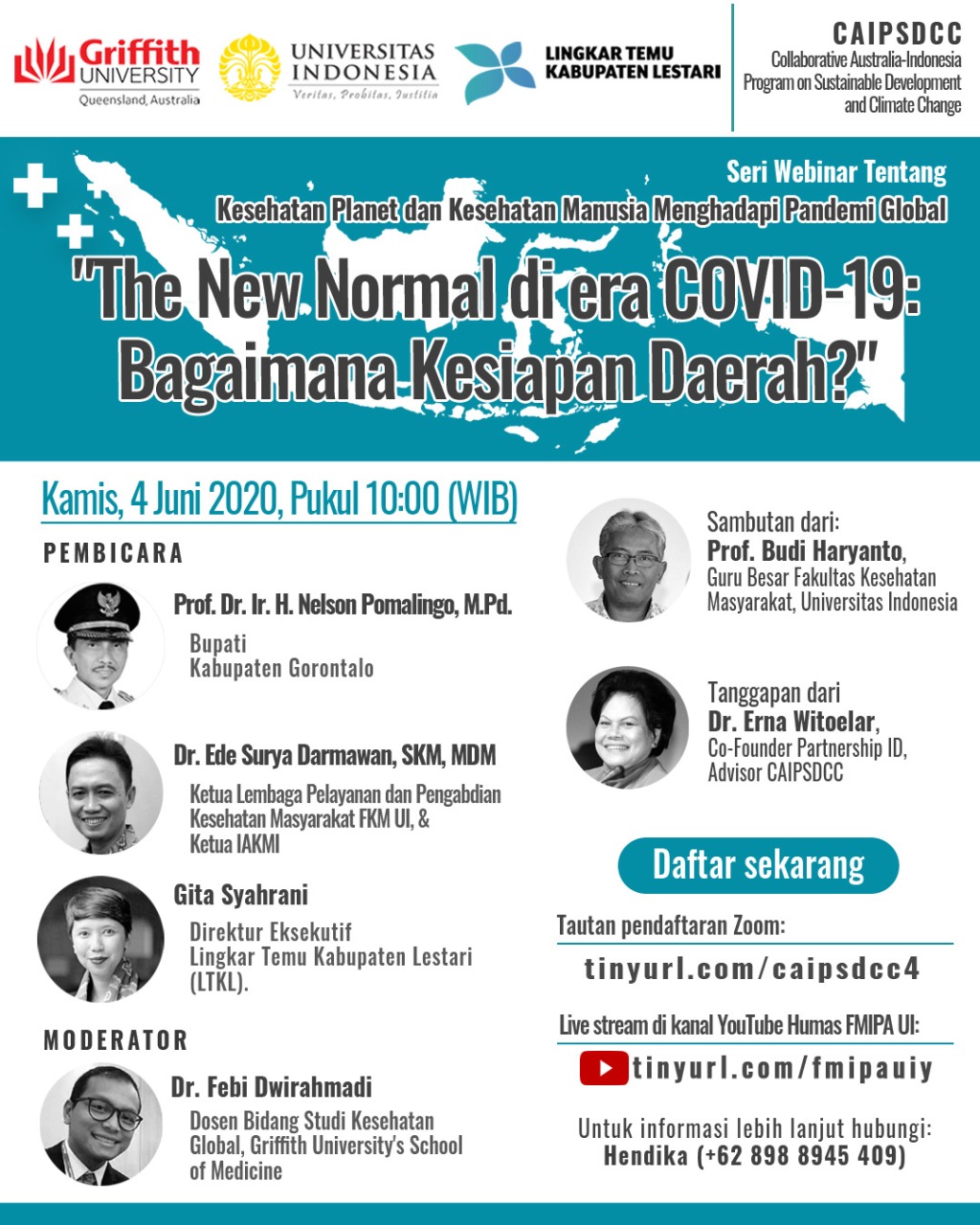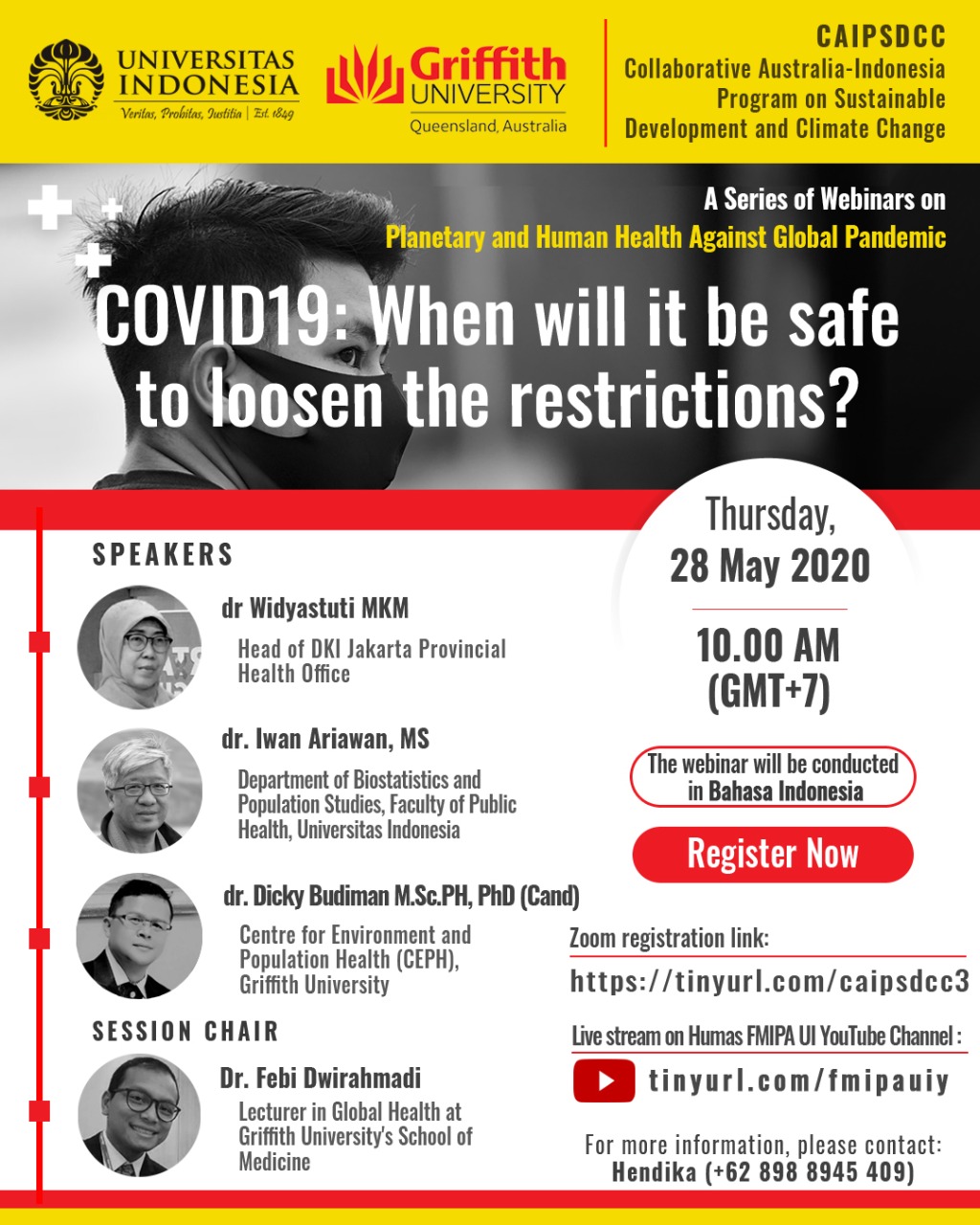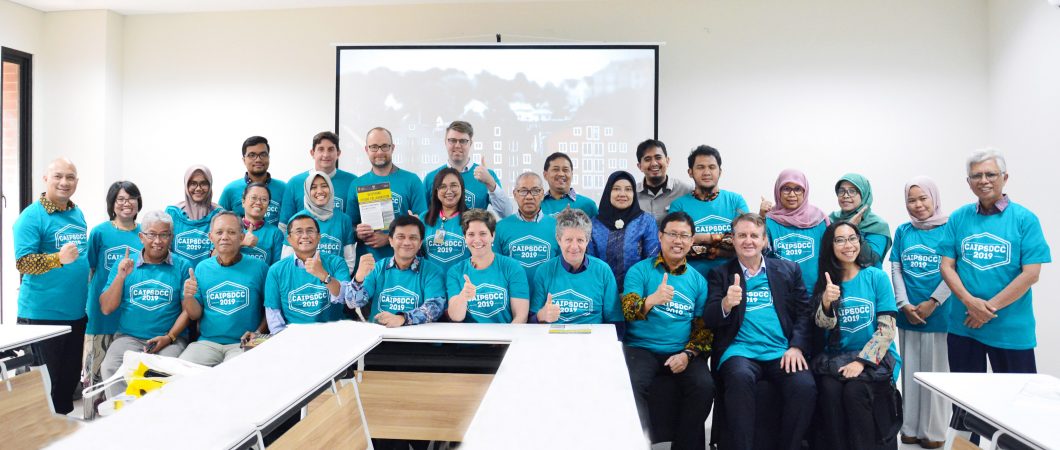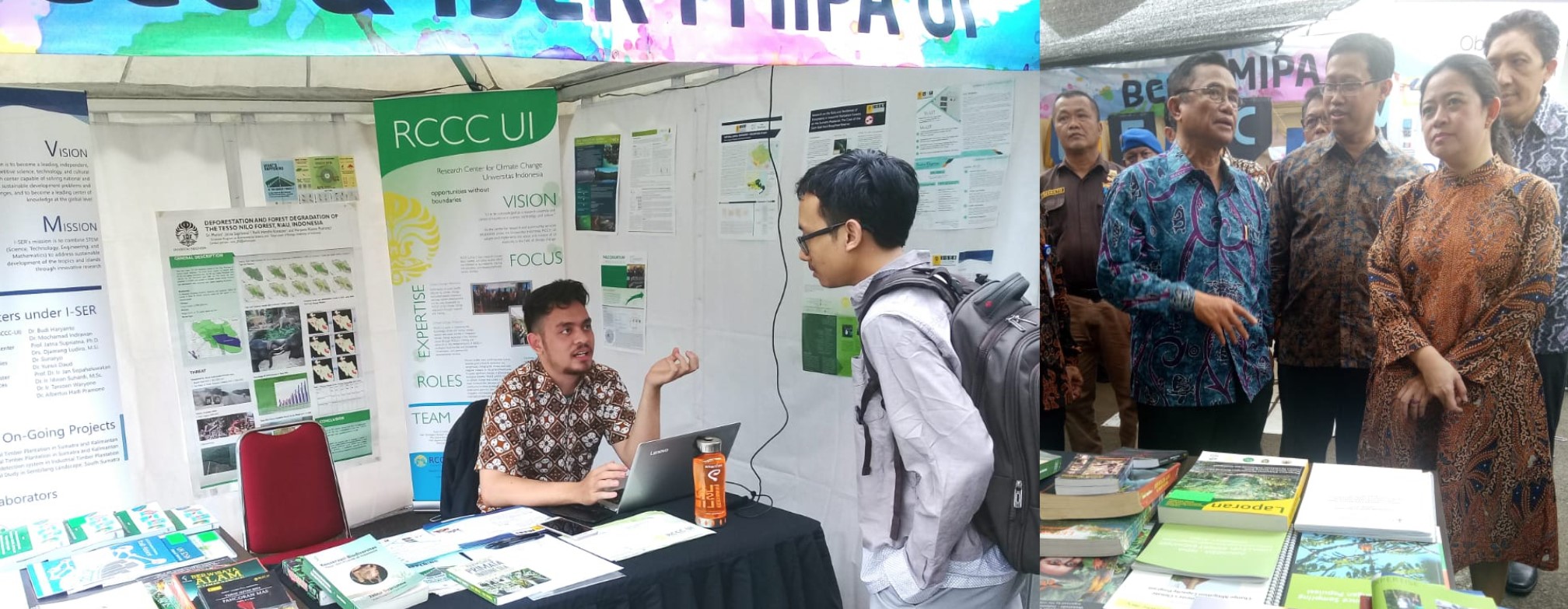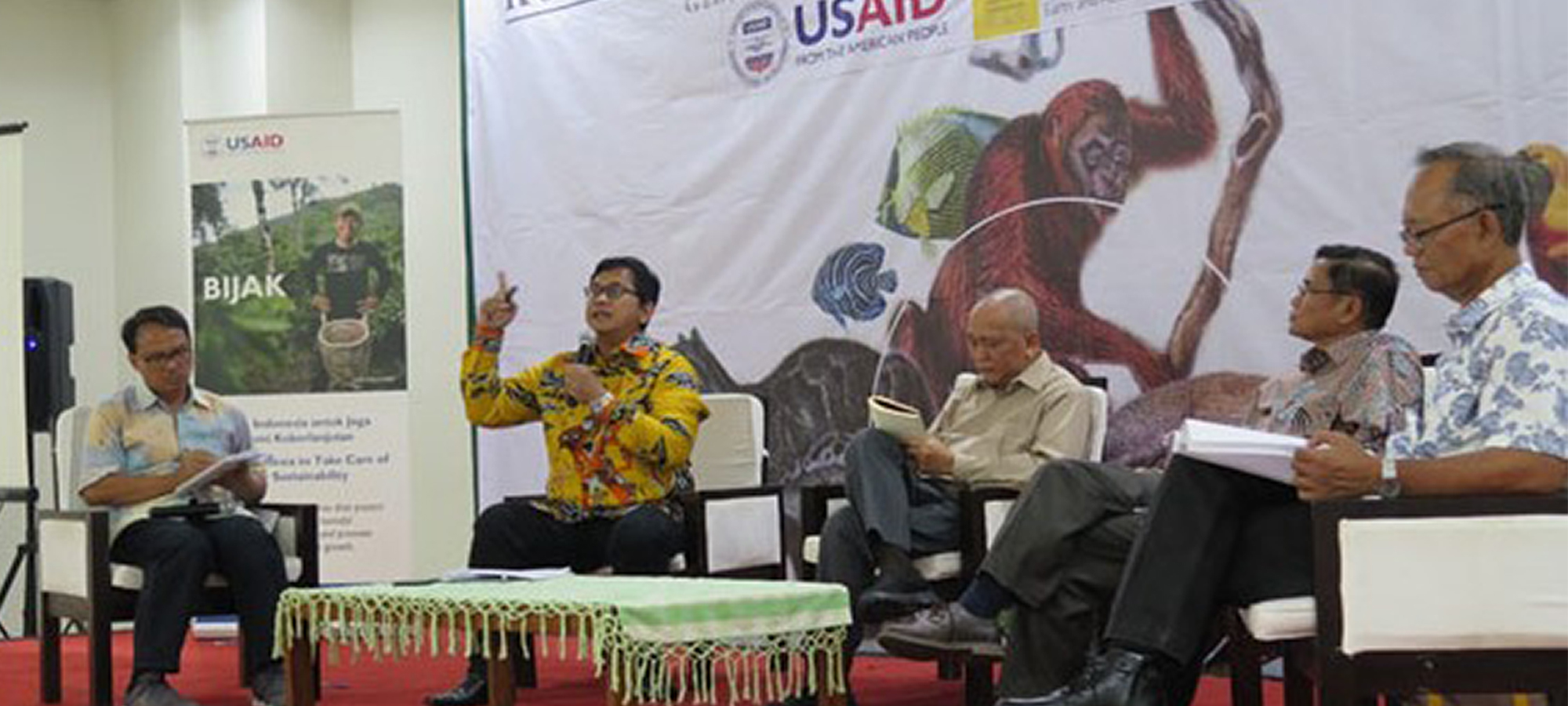The New Normal in the Era of COVID-19: Are the Local Government Ready?
On June 4, 2020, a webinar with the title “The New Normal in the Era of COVID-19: Are the Local Government Ready?” was organized by the Collaborative Australia-Indonesia Program on Sustainable Development and Climate Change (CAIPSDCC), a collaborative program between the University of Indonesia and Griffith University, Australia. With more than 300 online participants, this is the third of the webinar series with the main topic on Planetary and Human Health to Fight the Global Pandemics.
The resource persons presented were:
- Prof. Dr. Ir. H. Nelson Pomalingo, M.Pd., Head of Gorontalo Regency
- Dr. Ede Surya Darmawan, SKM, MDM, Chair of the Community Health Services, Universitas Indonesia & Chair of the Indonesian Society of Health Experts (IAKMI)
- Gita Syahrani, Executive Director of the Sustainable District Association (LTKL).
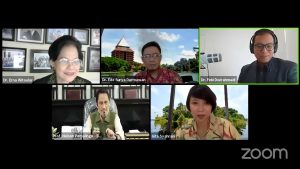
Dr. Erna Witoelar, CAIPSDCC advisor was also present as a reviewer. Prof. Budi Haryanto, Professor of Environmental Health Sciences, Universitas Indonesia delivered the opening remarks and Dr. Febi Dwirahmadi, Lecturer in Global Health at Griffith University School of Medicine, Australia was leading the discussion.
In his remarks, Prof. Budi Haryanto stated that there are several steps that must be achieved to loosen the social restriction. First, there has to be a decrease in the epidemiological curve by 50% of the peak cases, at least for 2-3 consecutive weeks. Second, social and physical distancing measures as well as hand washing and the use of masks have become the new norms. Third, contact tracing has been strengthened. Fourth, health services must be prepared to face the possibility of increasing cases.
Dr. Febi Dwirahmadi, who currently resides in Australia, opened the discussion by stating that the pandemic must involve a massive scale of behavioral change of people, institutions, and governments around the world. In the state of Queensland, Australia, which is gradually reducing restrictions, changes have taken place. For example, payment transactions are now contactless; Friday prayers are carried out in several sessions, a maximum of 20 worshipers per session, and others.
Prof. Nelson Pomalingo opened his presentation by stating that currently there have been 6 COVID-19 fatalities in Gorontalo Province, 2 of them from Gorontalo District. He also stated that the social aspects of people’s lives were very much impacted, such as education and religion. The economic sector was also affected, which can be seen from an increase in unemployment rate and a decrease in people’s income. Although, economic growth is still quite stable considering the majority of industries are in the agricultural sector. However, if this continues, there will still be a weakening of the regional economy. Budget and development in various sectors also experienced major cuts, resulting in many delays in infrastructure developments.
Some of the responds taken by Gorontalo District to the pandemic, including:
- Institutional formation. The COVID-19 task force was formed with several task units down to the village level.
- Planning activities through the preparation of a road map, including prevention and social security measures from various funding sources, both from the central, provincial, district, village funds, and funds from the community.
- Recovery activities that will be carried out in July. One of them is through budget rationalization.
Transmission prevention measures are carried out through preventive actions:
- Public outreach and education by officers, social and conventional media, banners, and others. The New Behavior Norms simulation was conducted at community gathering places such as schools, mosques and markets to help people adapt to health protocols.
- Closure of public center; curfew enforcement; and work from home policies; and the implementation of Village Scale Social Restrictions based on case map data.
- Enforcement of norms in the health protocol carried out through the establishment of posts and checkpoints in the village.
- Good coordination with various parties through the Pentahelix model approach, which is where elements of government, society, academics, entrepreneurs, and the media unite.
Mass rapid tests are also being conducted especially for medical personnel, local government officials, field officers, market traders and cashiers in supermarkets, to industrial employees. So far 5000 tests have been carried out. Other innovative approaches such as distilling liquor into alcohol for hand sanitizers, as well as providing masks and protective equipment for medical personnel using local industry.
Prof. Nelson explained that he saw the New Behavior Norms as an effort to make peace with yourself and the environment to face COVID-19. It needs to start by making a concept that involves experts from universities as a reference in developing regulations. Implementation of the New Behavior Norms in Gorontalo District is carried out in phases. Phase 1, mosques, markets, offices, industry, transportation will be opened. Phase 2, activities in the open area will be allowed. Stage 3, tourism will be started. Stage 4, school will be opened, and large-scale economic activities. Stage 5, large-scale social activities. Regarding the opening of the school, the teachers will be tested to give reassurance for parents to send their children back to school.
Dr. Ede stated that the number of COVID-19 cases in the world and Indonesia is still increasing, and when this will end is still unknown. The large scale social restriction (PSBB) clearly limits mobility which helps reduce transmission. This can be seen in Jakarta, which at first became an epicenter, but now the epidemiological curve is flattening. The Indonesian Association of Public Health Experts estimates that the easing of social restrictions will cause an increase in the number of cases by 1.6 times, with a peak in mid-July. So far, the predicted results of the average daily case do not differ much from the actual data of the case.
The main problem to date is the low testing capacity. Indonesia’s testing capacity is still low when compared to the population and other countries. In addition, the mortality rate is still relatively high at around 6%. Strengthening prevention efforts must be a focus in handling the COVID-19 pandemic along with increasing testing capacity so as not to burden health services.
Moving forward, the new normal becomes the path that must be taken. Ede explained that the new normal is how to prepare communities to face any pandemic with the following things:
- Breaking the chain of transmission with new norms of behavior such as wearing a mask, keeping a distance, or staying at home.
- Mutual collaboration between the community and health workers such as epidemiologists, nutritionists, laboratories, nurses, volunteers, community health centers, etc.
- Adequate health facilities. Hospitals, community health centers, and medical personnel need to be distributed in proportion to the needs effectively and also they need to be protected.
- Clear, decisive, and synchronous policies based on data, and science, not opinions. And the contribution of the business world.
The Indonesian Association of Public Health Experts calls for 5 ways against COVID-19. First, through a healthier life. Second, the community health centers must be able to support and assist the community to prevent and fight COVID-19. Third, local governments must be able to handle COVID-19 through PDR (Prevent, Detect, Respond) and TTTI (Test, Trace, Treat, and Isolate). Fourth, epidemiological maps must be the basis for decision making (evidence based policy). Finally, healthy living protocols must be implemented in every sector of life.
The new normal must focus on how to strengthen and empower the community in responding to the health crisis. Ideally, all governors, regents and mayors should work together to strengthen the readiness of all parties down to the village level, because the community is the front guard against COVID-19.
Gita Syahrani gave a presentation from the perspective of the district members of the Sustainable District Association (LTKL), where there were a number of interesting innovations from each region. LTKL members are spread across Kalimantan, Sumatra and Sulawesi island, each of which has its own approach, including in responding to COVID-19 and other challenges. LTKL has mapped five main needs related to the pandemic, namely assistance related to capacity development, communication, logistical, research, and financial aspects. The most dominant is the logistical need which then followed by the need to increase the human resource capacity. Research assistance is also needed, especially practical advice from academics for developing the new normal scenarios as well as the new behavior or recovery of each district.
Three LTKL districts have been designated as the new normal pilot by the national governments, namely Gorontalo, Bone Bolango and Siak Regencies. The key factors for an area to enter the new normal are innovative and applicable policies/solutions, involving aspects of mutual cooperation of various parties, and sustainable aspects of the solutions taken. Maintaining ecosystem sustainability will create trickling down effects on economic productivity and disaster resilience. For example, in areas with well-preserved forests and peatlands, communities can still get water easily and sources of livelihood are maintained. Farmers who hold sustainability principles can continue to produce food products. In addition, it will reduce the risk of natural and non-natural disasters, including forest and land fires, floods, and landslides.
Upholding the spirit of mutual cooperation, LTKL took several approaches to adapt to the pandemic. Such as the programs focusing on capacity building in the form of online classes; building resilience in the supply chain for food access and market access; and socialization to the community to ensure that they remain protected from COVID-19, etc.
Dr. Erna Witoelar stated that during a major issue such as COVID-19, local leadership plays a key role. This needs the support of scientists who can help understand the disaster we face, as well as the lessons learned which include the new habits that we must adopt in order to deal with disasters. We must not return to our previous bad habits. The New Normal is not back to old normal.
Improving habits to be healthier and cleaner must be followed by a commitment to achieve sustainability, such as preventing excessive consumption and overexploitation of nature. The mutual cooperation habits of various parties to face common challenges must also be continued. The leadership will change, but if all parties have been involved, efforts to achieve the common good will continue. Ms. Erna also emphasized that leaders must be realistic and acknowledge the problems they face, so that they do not endanger the people. Momentum towards the new normal should also be used to overcome other problems that can be overcome through better new norms.


